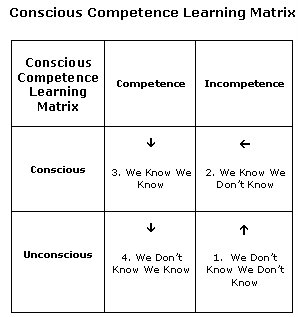The Conscious Competance Learning Matrix

I found this quite helpful for thinking about how to teach others knew skills. You have to understand where your subject is on this on this cycle before you effectively help them move on. I'm sure we all figure out different approaches to teaching/coaching accroding to where the student find themself on the cycle.
I'll paste some blurb below:
Learning can be said to take place in four stages:
I Unconscious incompetence
Blissful ignoranceConfidence exceeds ability, we are not knowledgeable/skilfulWe don't know we don't know.
II Conscious incompetence
We discover a skill we wish to learn - driving a car, riding a bikeConfidence drops as we realise our ability is limitedWe need to practise to learn. Often this means not succeeding at first. This is learning; unfortunately, in our culture it is often labelled 'failure'. We feel uncomfortable.We know what we don't know.
III Conscious competence
We acquire the skill. We have become consciously competent. Our conscious mind can only cope with a small number of new bits of information at any one time.Our confidence increases with our ability, we have to concentrate on what we know/doCan do if know how to.
IV Unconscious competence
Lastly, we blend the skills together and they become habits - we can then do them while our mind is on other things.We have reached the stage of unconscious competence.Our confidence and ability have peaked, we no longer have to concentrate on what we know/do; this is the start of the next learning curve


